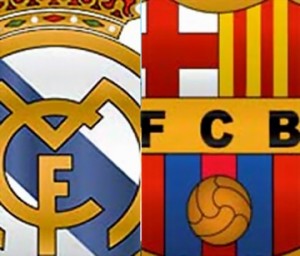
Eighteen days, four games and the spoils of almost an entire season to be fought over. Barcelona and Real Madrid usually play each other twice over the course of a season, in their home and away liga fixtures. But due to a combination of luck and their own good form, the biggest rivalry in European football, with all its sporting, cultural and political undercurrents, will be played out four times in just over two weeks, between April 16 and May 3.
There’s so much at stake and yet each encounter is loaded with slightly different significance. Of the three titles that these four games – a league match, the King’s Cup final and a two-legged Champions League semifinal – represent, the league offers the least tension here. Barcelona enjoy an eight-point lead over Madrid with seven games to play and the Catalans already seem to have secured a third straight title.
The King’s Cup on April 20, meanwhile, is the only game of the four that offers instant silverware. Madrid have not reached the final since losing to Zaragoza in 2004, while Barça took the Cup two seasons ago as part of the team’s unprecedented triple. This trophy cannot match the lustre of the league or Champions League, but for both these teams, beating the auld enemy in the final would give it a golden sheen.
The double-headed Champions League encounter is perhaps the most enticing prospect of the four. Madrid, in the European wilderness for the best part of a decade, finally looks capable of securing its longed-for décima, a 10th European Cup. Barcelona only has three Champions League titles, but those it won in 2006 and 2009 cemented its status as the home of Europe’s finest football.
And one of the subplots at the heart of this quadruple clash is the notion that Barcelona represents the vibrant present, while Real Madrid is the sepia-tinged past. That, of course, is an over-characterisation but it is true that much of Madrid’s glory is a long way off in the past, in the days when Di Stéfano and Puskás lit up the Bernabéu. More recently, the likes of Zidane, Figo and Raúl have also contributed to Madrid’s weighty folklore, but Barcelona is the team that has set the world on fire in the last five years.
And it seems Barcelona’s players are all too aware of this. Of their 160 league meetings, Real Madrid have beaten Barcelona 68 times, to the Catalans’ 62 victories (and 30 draws). When reminded of this fact by an interviewer, Barça goalkeeper Víctor Valdés replied: “But were (Madrid’s wins) in black-and-white or in colour?”
That was a rare deviation from the script for the Barcelona player, given that coach Pep Guardiola has in the main managed to instil in his charges a refusal to rest on their laurels and a prudent avoidance of anti-Madrid morbo.
Two managers, two styles
Even Madrid’s José Mourinho has not stoked the fires of rivalry the way he routinely did in his previous coaching posts. While he has spent most of the season complaining about refereeing decisions and a supposed conspiracy by the authorities to make Madrid’s schedule particularly tough, in his first year at Madrid Mourinho has avoided playing mind games with the diplomatic Guardiola. This might be partly because of the generally high esteem in which the Barça coach is held in Spain. But also Mourinho might have realised that in this country his more outrageous outbursts are not greeted with the kind of glee they enjoyed in Italy or England.
These fixtures offer plenty of tantalising duels: Leo Messi versus Cristiano Ronaldo, Valdés versus Iker Casillas, or Xavi Hernández versus Xabi Alonso. They also represent not just a clash of two styles of play, but also of two styles of management: the self-taught Portuguese pragmatist versus the Catalan idealist steeped in Barça’s attack-minded Cruyffism.
Mourinho’s Madrid were clearly undercooked when losing 5-0 at the Camp Nou in November, but look more coherent now. Barcelona have been rampaging through the season, but there is a feeling the team might have peaked already. Mourinho’s incentive is to avenge that clásico defeat, the worst of his career, while Guardiola must be desperate to put behind him last year’s Champions League semifinal, which saw the Portuguese’s Inter team squeeze through to the final.
The array of potential results of the four games would keep a mathematician busy, let alone a football pundit. If Barcelona win the league game and the King’s Cup, yet Madrid reach the Champions League final, whose is the glory? If Barcelona take a 1-0 advantage into the second leg of the Champions League tie will they still play with their typical attacking abandon? How the devil will Guardiola keep his customary cool in the face of four such enormous games?
By May 3, we’ll have all the answers.
MU are peaking and looking good. If they reach the Champions League final they will give either Spanish team a good game, and may benefit from the match being played at Wembley in England.